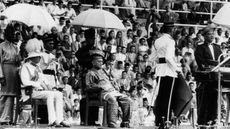22 December 1973: Opec more than doubles the price of oil
On this day in 1973 Opec, the oil price cartel, more than doubled the price of oil from $5.12 a barrel to $11.65.
On this day in 1973 Opec more than doubled the price of oil overnight from $5.12 a barrel – around $60 in today's money (the price of oil is currently around $50) – to $11.65 (around $145 now). The initial price was in fact as a result of being raised a few months earlier from $3. The price increase caused the legendary 1973 oil crisis, and was a major shock for the Western world economy.
The reason behind the price rise was political. Israel had just won the Yom Kippur War against Egypt and Syria – the two Arab countries had launched a surprise attack on Israel during the Jewish Yom Kippur festival with the aim of reversing the losses of the Six Day War in 1967 and reassert Arab claims over the region.
However, the Opec move was not designed against Israel. It was meant to hurt the United States who had quickly and heavily supplied Israel with military equipment to fight the war, as well as providing political support.
Subscribe to MoneyWeek
Subscribe to MoneyWeek today and get your first six magazine issues absolutely FREE

Sign up to Money Morning
Don't miss the latest investment and personal finances news, market analysis, plus money-saving tips with our free twice-daily newsletter
Don't miss the latest investment and personal finances news, market analysis, plus money-saving tips with our free twice-daily newsletter
Richard Nixon, the US president at the time, created a new short term Energy Office to deal with the crisis. It implemented price controls which forced “old oil” to stay at a certain price, while newly discovered oil was allowed to be sold at market rates.
It was meant to reduce dependence on Arab oil by opening up new suppliers. However, the result was an artificial shortage in fuel because “old oil” disappeared from the market. To tackle this, the government introduced a rationing programme and even reduced the speed limit to 55mph to cut consumption.
Eventually, the crisis ended through a negotiated settlement between Israel and the Arab countries. Israel came out on top overall but relinquished some of the new land it had taken during the war.
-
 Barclays warns of significant rise in social media investment scams
Barclays warns of significant rise in social media investment scamsInvestment scam victims are losing an average £14k, with 61% of those falling for one over social media. Here's how to spot one and keep your money safe
By Oojal Dhanjal Published
-
 Over a thousand savings accounts now offer inflation-busting rates – how long will they stick around?
Over a thousand savings accounts now offer inflation-busting rates – how long will they stick around?The rate of UK inflation slowed again in March, boosting the opportunity for savers to earn real returns on cash in the bank. But you will need to act fast to secure the best deals.
By Katie Williams Published
-
 31 August 1957: the Federation of Malaya declares independence from the UK
31 August 1957: the Federation of Malaya declares independence from the UKFeatures On this day in 1957, after ten years of preparation, the Federation of Malaya became an independent nation.
By Jasper Spires Published
-
13 April 1960: the first satellite navigation system is launched
Features On this day in 1960, Nasa sent the Transit 1B satellite into orbit to provide positioning for the US Navy’s fleet of Polaris ballistic missile submarines.
By Ben Judge Published
-
9 April 1838: National Gallery opens in Trafalgar Square
Features On this day in 1838, William Wilkins’ new National Gallery building in Trafalgar Square opened to the public.
By Ben Judge Published
-
3 March 1962: British Antarctic Territory is created
Features On this day in 1962, Britain formed the British Antarctic Territory administered from the Falkland Islands.
By Chris Carter Published
-
10 March 2000: the dotcom bubble peaks
Features Tech mania fanned by the dawning of the internet age inflated the dotcom bubble to maximum extent, on this day in 2000.
By Chris Carter Last updated
-
9 March 1776: Adam Smith publishes 'The Wealth of Nations'
Features On this day in 1776, Adam Smith, the “father of modern economics”, published his hugely influential book The Wealth of Nations.
By Ben Judge Last updated
-
8 March 1817: the New York Stock Exchange is formed
Features On this day in 1817, a group of brokers moved out of a New York coffee house to form what would become the biggest stock exchange in the world.
By Chris Carter Last updated
-
7 March 1969: Queen Elizabeth II officially opens the Victoria Line
Features On this day in 1969, Queen Elizabeth II took only her second trip on the tube to officially open the underground’s newest line – the Victoria Line.
By Ben Judge Last updated